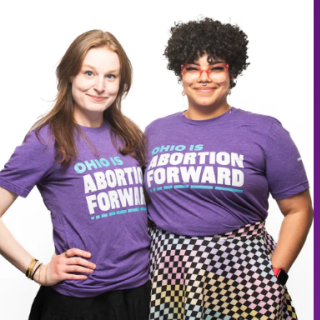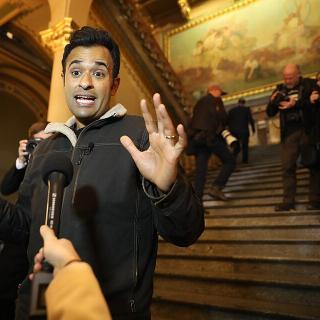“People should not have to work three jobs just to make ends meet,” said Columbus resident Jasmine Ayres at the “Our City, Our Stories, Our Future” public meeting and candidates’ night on October 1. “People who work 40 hours a week should be able to feed their families. They should be able to pay their bills. There are people who are really struggling in this city. They would really benefit from raising the minimum wage.”
“Minimum wage should cover at least the minimum cost of living,” said former OSU football defensive back Anthony Gwinn. “Can you imagine working 40 to 60 hours a week as a single parent and raising children with a minimum wage of $8.10?”
The moderator posed this question to ten candidates for Columbus City Council: “If elected to City Council, will you raise the Columbus minimum wage to $15 by 2020?”
Democrats
“I believe that it is currently unconstitutional in the State of Ohio for a city to raise the minimum wage,” said incumbent Jaiza Page. “I will as a member of Columbus City Council go to our state legislature” and encourage them “to raise the minimum wage, and to amend the constitution to allow cities to have the power to set their own minimum wages.”
Shannon Hardin agreed to push the state to allow cities to raise the minimum wage. “If we can’t get it through the Statehouse, we’ll have to do it through a citizens’ initiative,” he said. “I support raising the minimum wage.”
“I’m very supportive of cities being able to make that decision,” said Michael Stinziano. “But we have a Secretary of State who refused to put fracking initiatives on the ballot. And we have a state Supreme Court that backed it up. I’m very concerned about the rules that are in place. Whether or not we can that with our constitution is going to be our challenge.”
“I support raising the minimum wage to $15 an hour in Columbus,” said Elizabeth Brown. But “I think the Ohio Supreme Court may not agree with me on that. Unfortunately a lot of the elected state officeholders right now are Republican. Their platform at the state level is very anti low-wage worker.”
“If we can do it legally, I support raising the minimum wage in Columbus,” said Zach Klein. “I just hope that the same activism and level of excitement that this group has for raising the minimum wage is the same for paid sick leave, for paid parental leave. This is not a silver bullet. We need affordable housing. We need other policies that are going to help families succeed in these times.”
This is the same tactic that Klein and some of his colleagues used in their remarks about the civilian review board proposal: defusing support for a specific initiative by shifting the focus to the big picture.
No Democrat will openly oppose raising the minimum wage. But with the exception of Elizabeth Brown, the Democratic candidates avoided saying the number 15. If the Democrats on Columbus City Council follow the example of their party in Seattle, they will do everything they can to dilute the demand for $15 an hour down to a lower number, and push through other loopholes that are acceptable to their corporate sponsors.
Write-in candidate Joe Motil took the incumbent Democrats to task. “In May 2014 I put before the Columbus Charter Review Commission a request that a $10 an hour minimum wage be placed on the ballot. They had the authority to but it on the ballot, but they said no, it’s a state issue. And City Council said ‘we agree.’ They’re talking out of both sides of their mouths.”
Republicans
“I don’t know if it’s enough,” said John Rush. “The federal poverty level is outdated, and it’s also a problem that we measure poverty at the federal level rather than the local level. When we look at the cost of living in Columbus I’m not sure $15 an hour will be enough.” Rush committed to putting pressure on the state legislature as Jaiza Page described.
“I don’t know where the $15 minimum wage thing came from,” said Besmira Sharrah. “But I know that to pay rent in Columbus, you need 720 bucks. With the current minimum wage, you’d have to work about 80 hours a week. When you talk about minimum wage, think about the cost of housing.”
Dimitrious Stanley balked at the $15/hour figure. “I’m a small business owner,” he said. “I can’t pay $15 and compete with larger businesses. If you do a blanket increase to 15, you’re going shut people like me down.”
Moderator Stuart McIntyre posed an alternative question to Stanley: “Would you support a $15 an hour minimum wage in Columbus with a small business exemption?”
“Yes,” Stanley said.
“Once we raise it, we can expand opportunities for small businesses and decrease income taxes in the city,” said Ibrahima Sow. “If people have more income, they have more to spend it on, and that comes back to local government. So no one is losing if we do it right.”
As political outsiders to City Council, the Republican candidates stayed well away from their party line to send an alternative message to voters. None of them trotted out the worn-out propaganda we usually hear from Republicans: that raising the minimum wage causes job losses.
But in reality, if the Republicans manage to break up one-party rule in Columbus, once in office they will be just as beholden to corporate interests as the Democrats. A$15 minimum wage would cut into the profits of some very large corporate campaign donors. Republican politicians love their corporate masters as much as Democrats do.
The real barrier to genuine democracy in Columbus is that it’s a pay-to-play system, whichever of the two corporate parties is in office. To overcome the staggering economic inequality in Columbus, an alternative political party is needed — one that accepts no corporate cash, and is therefore free to truly represent the people.



